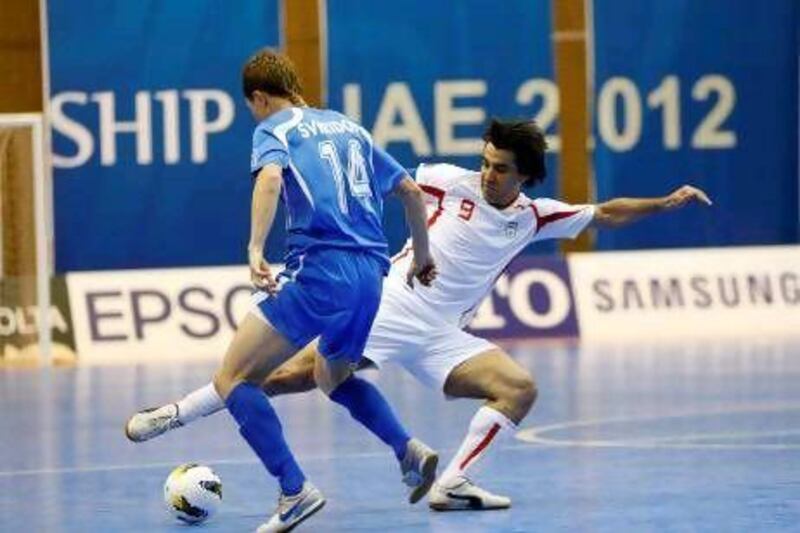It is not often a coach is able to put on a brave face after his team have just been thrashed 9-0. But Steven Knight, the Australia coach, came in smiling for his post-match conference after the Futsalroos were given a masterclass by Iran in their final group game on Sunday.
"You can go and watch that every night," said Knight, who has represented Australia at two Futsal World Championships. "Wouldn't want to play against them every night though. It was just wonderful."
If the Iranian futsal team was fishing for compliments, they could not have asked for a better one. But given their absolute domination of the sport in Asia, they are probably used to such accolades.
Ranked No 6 in the world, Team Melli, who boast futsal's leading goalscorer in Vahid Shamsaee among many other top-class players, are in a league of their own.
They have won all but one of the 11 AFC Futsal Championships up to now and they look all set to add another after cruising into the semi-finals with a 6-3 win over Uzbekistan yesterday.
On the global stage, the Iranians have featured in five Fifa Futsal World Championships, reaching the semi-finals on their first appearance in 1992. They won the first Confederations Cup in Libya in 2009, and reached the finals of Grand Prix de Futsal, known as the Futsal Mini-World Cup, in 2007 and 2009.
"For me, Iran are one of the three best teams in the world, alongside Brazil and Spain," said Uzbekistan's Spanish coach Jose Mendez. "They have a lot of experienced players who have played in the World Cup many times and many big tournaments."
The Iranian dominance, of course, has not come about by chance. According to Abbas Torabian, the president of the Iran Futsal Association, it has taken a lot of hard work and a lot of planning, and they have learnt from playing against the best.
"From the beginning in 1998, we took the sport very seriously," Torabian said. "We realised we had to play against the best teams if we wanted to improve. If we were going to lose, no problem. But we wanted our players to see these big teams and big players, and learn how to stand up against them.
"We now have three national teams as well as a very strong league. We have a super league, a first division and a second division, and we even have a youth division, which keeps producing and increasing our pool of players.
"That's why sometimes, our coach goes crazy trying to choose the national team. But it is a good headache to have."
In Iran, thousands of fans pack the stands to watch the local league matches. There were a few hundred of them at the Al Shabab stadium as well and, together with the Uzbek fans, they created a great atmosphere, one that would have been worthy of the final.
Both teams were indeed expected to meet in the final; they did so in the last Asian championship in 2010, which Iran had clinched 8-3. But Kuwait surprised everyone by topping Uzbekistan's group and the central Asians were left with the onerous task of upstaging the 10-time champions.
In 16 previous matches between the Asian No 1 and No 4 teams, Uzbekistan had beaten Iran just once and lost 15.
The other top Asian teams have not fared any better against Iran. Japan have lost 13 of the 18 matches between the two sides and won only three.
Thailand, ranked No 2 in Asia, have been beaten in 12 of the 17 matches they have played against Iran and won three.
Australia, the continent's No 5, have lost both their matches against Iran.
Outside Asia, Iran have beaten every team in the world - Spain, Portugal and Italy included - except the masters Brazil, who once had a 34-year unbeaten run in futsal. That winning streak came to an end at the 1985 World Championships in Australia, when Paraguay beat Brazil for the title.
Iran's domination of Asian futsal, of course, is similar to Brazil's. The only Asian Championship they have failed to win was in 2006 in Uzbekistan, when Japan stopped them in the semi-finals.
The gap between Iran and the rest, however, is closing, according to Mendez.
"It's true that there is a big difference between Iran and the rest of the teams," he said. "But gradually, teams will get closer to them as well.
"I remember, Iran would win very easily in the Asian Championship. But now they have to run more and fight more to win their games."
Ali Sanei, the Iran coach, concedes the level of the other teams is rising, but he does not expect their country's domination to come to an end anytime soon.
"Of course, the other teams are making good progress," he said. "We are improving as well, but our progress will not be as visible since we are already at the top.
"Wherever in the world, whenever they talk about futsal, one of the names is Iran."
Follow us
[ @SprtNationalUAE ]





